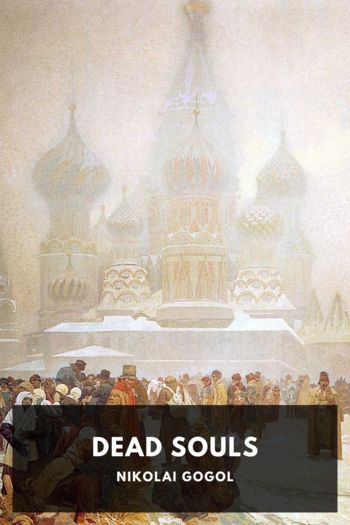Short Fiction - Nikolai Gogol (best selling autobiographies TXT) 📗

- Author: Nikolai Gogol
Book online «Short Fiction - Nikolai Gogol (best selling autobiographies TXT) 📗». Author Nikolai Gogol
“What is there?” said Pulcheria Ivanovna: “shall I go and tell them to bring you some berry tarts which I had set aside for you?”
“That would be good,” replied Afanasii Ivanovich.
“Or perhaps you could eat some kissel?”28
“That is good too,” replied Afanasii Ivanovich; whereupon all was brought immediately, and eaten in due course.
Before supper Afanasii Ivanovich took another snack. At half-past nine they sat down to supper. After supper they went directly to bed, and universal silence settled down upon this busy yet quiet nook.
The chamber in which Afanasii Ivanovich and Pulcheria Ivanovna slept was so hot that very few people could have stayed in it more than a few hours; but Afanasii Ivanovich, for the sake of more warmth, slept upon the stove-bench, although the excessive heat caused him to rise several times in the course of the night, and walk about the room. Sometimes Afanasii Ivanovich groaned as he walked about the room.
Then Pulcheria Ivanovna inquired, “Why do you groan, Afanasii Ivanovich?”
“God knows, Pulcheria Ivanovna! it seems as if my stomach ached a little,” said Afanasii Ivanovich.
“Hadn’t you better eat something, Afanasii Ivanovich?”
“I don’t know—perhaps it would be well, Pulcheria Ivanovna. By the way, what is there to eat?”
“Sour milk, or some stewed dried pears.”
“If you please, I will try them,” said Afanasii Ivanovich. The sleepy maid was sent to ransack the cupboards, and Afanasii Ivanovich ate a plateful; after which he remarked, “Now I seem to feel relieved.”
Sometimes when the weather was clear, and the rooms were very much heated, Afanasii Ivanovich got merry, and loved to tease Pulcheria Ivanovna, and talk of something out of the ordinary.
“Well, Pulcheria Ivanovna,” he said, “what if our house were to suddenly burn down, what would become of us?”
“God forbid!” ejaculated Pulcheria Ivanovna, crossing herself.
“Well, now, just suppose a case, that our house should burn down. Where should we go then?”
“God knows what you are saying, Afanasii Ivanovich! How could our house burn down? God will not permit that.”
“Well, but if it did burn?”
“Well, then, we should go to the kitchen. You could occupy for a time the room which the housekeeper now has.”
“But if the kitchen burned too?”
“The idea! God will preserve us from such a catastrophe as the house and the kitchen both burning down. In that case, we could go into the storehouse while a new house was being built.”
“And if the storehouse burned also?”
“God knows what you are saying! I won’t listen to you! it is a sin to talk so, and God will punish you for such speeches.”
But Afanasii Ivanovich, content with having had his joke over Pulcheria Ivanovna, sat quietly in his chair, and smiled.
But the old people were most interesting of all to me when they had visitors. Then everything about their house assumed a different aspect. It may be said that these good people only lived for their guests. They vied with each other in offering you everything which the place produced. But the most pleasing feature of it all to me was, that, in all their kindliness, there was nothing feigned. Their kindness and readiness to oblige were so gently expressed in their faces, so became them, that you involuntarily yielded to their requests. These were the outcome of the pure, clear simplicity of their good, sincere souls. Their joy was not at all of the sort with which the official of the court favors you, when he has become a personage through your exertions, and calls you his benefactor, and fawns at your feet. No guest was ever permitted to depart on the day of his arrival: he must needs pass the night with them.
“How is it possible to set out at so late an hour upon so long a journey!” Pulcheria Ivanovna always observed. (The visitor usually lived three or four versts from them.)
“Of course,” said Afanasii Ivanovich, “it is impossible on all accounts; robbers, or some other evil men, will attack you.”
“May God in his mercy deliver us from robbers!” said Pulcheria Ivanovna. “And why mention such things at night? Robbers, or no robbers, it is dark, and no fit time to travel. And your coachman, … I know your coachman; he is so weak and small, any horse could kill him; besides, he has probably been drinking, and is now asleep somewhere.”
And the visitor was obliged to remain. But the evening in the warm, low room, cheerful, strewn with stories, the steam rising from the food upon the table, which was always nourishing, and cooked in a masterly manner—this was his reward. I seem now to see Afanasii Ivanovich bending to seat himself at the table, with his constant smile, and listening with attention, and even with delight, to his guest. The conversation often turned on politics. The guest, who also emerged but rarely from his village, frequently with significant mien and mysterious expression of countenance, aired his surmises, and told how the French had formed a secret compact with the English to let Bonaparte loose upon Russia again, or talked merely of the impending war; and then Afanasii Ivanovich often remarked, without appearing to look at Pulcheria Ivanovna: “I am thinking of going to the war myself. Why cannot I go to the war?”
“You have been already,” broke in Pulcheria Ivanovna. “Don’t believe him,” she said, turning to the visitor; “what good would he, an old man, do in the war? The very first soldier would shoot him; by Heaven, he would shoot him! he would take aim, and fire at him.”
“What?” said Afanasii Ivanovich. “I would shoot him.”
“Just listen to him!” interposed Pulcheria Ivanovna. “Why should he go to the war? And his





Comments (0)